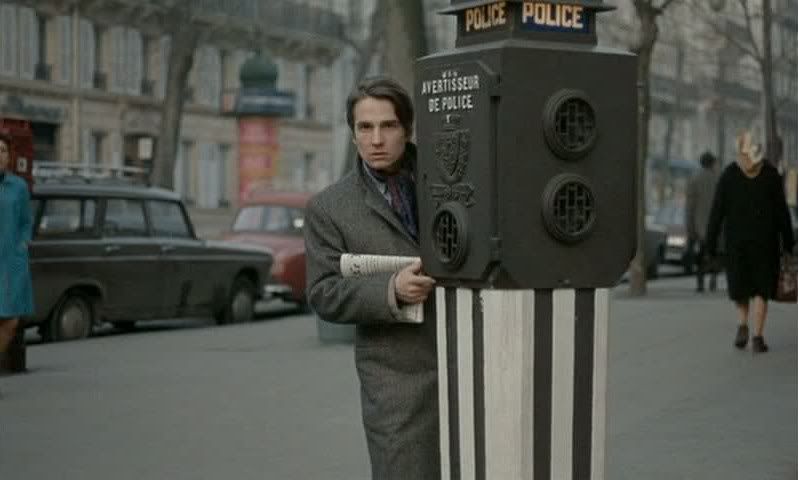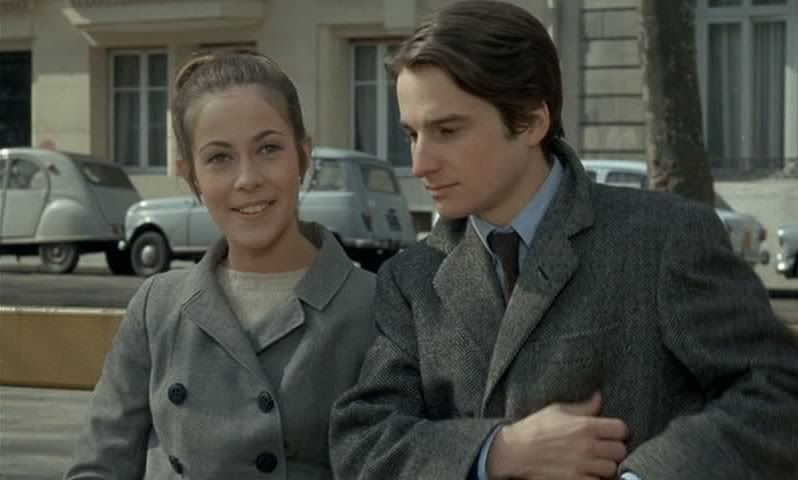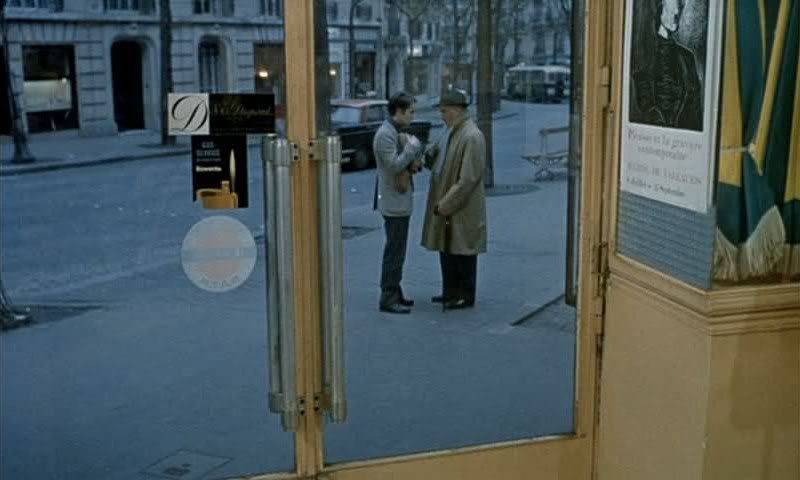
Stolen Kisses is the third installment in the series of Antoine Doinel tales that François Truffaut inaugurated with his debut feature The 400 Blows. The film opens several years after Truffaut's last visit with Antoine (played as always by Jean-Pierre Léaud), in the short film Antoine and Colette. As with the gap between The 400 Blows and that short, several years are left as an ellipsis between installments, with the effect that each new film in the series is like catching up with an old friend, learning what he's done and where he's been in the intervening years since his last appearance. Since Léaud grows up on screen with his cinematic counterpart, it's also a way of catching up with the actor, seeing how the fourteen year-old boy from The 400 Blows has matured into an independent young man with a vibrant, eclectic life both onscreen and off. When Stolen Kisses opens, Antoine has been in the army for three years, and at the very beginning of the film he's in a military prison, awaiting his release from the army after a troubled career as a private. During his exit interview with a superior officer, the man rattles off a list of Antoine's offenses, including all the bases where he'd gone AWOL, and Antoine smiles at each one, as though fondly recalling happy memories of what he'd done during each of these infractions; a whole history is suggested in those smiles.
It's a loving and playful re-introduction to this familiar character, an assurance that though Antoine has grown older he's still a charming misbehavior, a defiant young man with little tolerance for authority. Even more telling, perhaps, is what precedes this scene, an opening image which on the surface has no real connection to the rest of the film. During the credit sequence, Truffaut films the building that housed the then-closed Cinémathèque Franèais, which at the time of the making of this film was embroiled in the Langlois affair, when the firing of Henri Langlois, the Cinémathèque's longtime director (and mentor to the Cahiers du cinema group of filmmakers and critics), triggered student protests and riots demanding his reinstatement. Truffaut and Léaud were both on the frontlines of these protests, with the latter making fiery speeches on Langlois' behalf in front of that very building. Some text during the titles of Stolen Kisses dedicates the film to Langlois, but the film itself has only the most tenuous of connections to Langlois or to the protests and politics bubbling up around him at the time. The protests over Langlois' departure from the Cinémathèque would eventually seem like a precursor to the broader student riots of May 1968, but these political questions linger only at the edges of the film.
The Langlois affair is mentioned explicitly, once, by the parents of Antoine's sometime-girlfriend Christine (Claude Jade), who describe it in vague and slightly bemused terms, reflecting the generation gap between the older generation and those who, like Truffaut and Léaud and their associates, grew up with the Cinémathèque and with Langlois' tutelage. But Antoine and Christine are equally abstracted from the events; Christine gets off from school when boycotts break out at her university, and she uses it as an unexpected vacation, going skiing with her friends. Antoine, for his part, is totally unaware of any of it. Later, Christine mentions to him that some of her friends are involved in protests, but Antoine, absorbed in his job, barely listens, and that's the extent of the film's engagement with the political upheavals sweeping France at the time. It's a curious decision, this abstraction from the politics of the time, especially since both the director and the star were so heavily involved in the events in their personal lives. It's as though Truffaut is asserting, with his casual integration of the politics at the fringes of a politically content-free film, that he intends to keep his cinema somewhat separate from the upheavals of the time — a pointed rejection of the very different path taken by Jean-Luc Godard, and the increasing split between the two filmmakers and former friends. Truffaut's film makes a token nod to the politics, to the concerns that so occupied both Truffaut and Léaud off the set. Godard could not make such a separation between his politics, his life and the films he made, but Truffaut, it seems, could.

Instead, Stolen Kisses is largely concerned, like Antoine and Colette, with Antoine's romantic adventures, in this case especially his on/off relationship with Christine, with whom he has a relationship that mirrors his friendship/affair with Colette, even including his closeness with the girl's mother and stepfather, who are like surrogate parents for the adrift young man. In addition to the relationship with Christine, the film also traces Antoine's visits to prostitutes (including his very funny encounter with a pair of them early on) and his fascination with Fabienne (Delphine Seyrig), a beautiful older woman who's the wife of the shoe store owner Tabard (Michael Lonsdale). He meets this latter couple while working as a detective for a private investigation firm, one of several jobs he takes during the course of the film. Antoine is an inept detective, perhaps because his example is the movies: in one of the film's funniest scenes, Antoine, excited over his new job, follows a random woman on the street and acts so suspicious that she detects him almost instantly. His exaggerated cinema detective routine — hiding his face behind a newspaper, ducking behind trees, weaving back and forth behind his chosen target — is derived entirely from the language of detective films, with a heavy parodic spirit in the way he executes these maneuvers.
Indeed, Stolen Kisses is a comedy in a way that, for all the humorous moments in both The 400 Blows and Antoine and Colette, neither of the first two Antoine Doinel films were. This film often seems to be built around sketches, bits of comedic business like Antoine's introduction to the detective Henri (Harry-Max), in which the detective cons Antoine (in an short-lived job as a hotel desk clerk) into helping him get proof for an adultery case. The scene is pure antic slapstick, albeit somewhat clumsily staged, with jarring cuts and a kind of forced cheerfulness as the woman in the case sits in bed topless and the men yell at each other. Truffaut's comedy often seems forced and off-key like this, particularly in the scenes involving one of the detective agency's other clients, an obviously gay man who enlists the agency to track down his former boyfriend, a magician. Truffaut makes the gay man an object of mockery, emphasizing the way the agency's owner sees right through the man's explanation that he wants them to find his "friend." Later, when the detectives tell the man that his "friend" is now married with a pregnant wife, he loses it, assaulting the detectives and eventually getting carted away. (The best part of that scene, though, is Léaud's possibly unscripted sudden fall off camera, tripping over an unseen obstacle in the midst of the chaotic scene.) The gay man provides comedic relief, his heartache over his breakup an object of derision and implicit mockery — a stark contrast to the treatment of Antoine's naïve romanticism and obsession with his amour du jour in this series.
The film is more compelling in its comedy when it comes to Tabard, the shoe store owner who hires the agency, he says, because even though he's a very successful businessman and, he thinks, a decent guy, he believes that everyone in his life, from his employees to his wife, actually hates him. Even in his first interview, he gives a first hint as to his true character, casually letting slip his racist sentiments even while insisting that he doesn't discriminate against anyone in his store — even Arabs and Chinamen, he says, not realizing that he's revealing more clues than he thinks. It gets better. Antoine gets a job in Tabard's store to observe the store owner's (nasty) interactions with his employees, and becomes obsessed with Tabard's wife Fabienne. Tabard is a jerk with his wife, too, and it's obvious that she looks at him with barely veiled contempt and annoyance. When Tabard says that he once painted houses, his wife, with a girlish smile, jokes, "like Hitler." Tabard slams down his fork, obviously angry, but the way he phrases his response, it almost sounds like he thinks she insulted, not him, but Hitler, by calling the dictator "a housepainter." "Hitler painted landscapes," he says indignantly, with the air of a man tired of hearing his hero slandered. The portrayal of Tabard as a silly fascist who wonders why nobody likes him is the film's richest vein of comedy.

In a way, the structuring of Stolen Kisses as a comedy robs the film of the depths conveyed by the earlier Antoine Doinel stories. In this film, Antoine is almost a bystander in his own story, observing the action and the weird characters around him but staying curiously uninvolved — which also works as a metaphor for the film's lack of political involvement. Antoine is almost a placeholder in this film, the strong emotions he displayed in the earlier films somewhat dimmed, held at a distance. The film is about Antoine's slow realization that he has to finally grow up, and in the final scene — having reconciled with Christine and proposed to her after a fling with Fabienne — he comes face to face with a romantic, passionate young man who wildly declares his love to Christine, who calls him "crazy." Antoine, one senses, would recognize himself in this fiercely romantic and impetuous man, and as Antoine walks away with Christine at the end of the film, disappearing down a tree-lined boulevard, he's leaving behind that iteration of himself. It's a powerful conclusion, but not one that's organically developed in the rest of the film, as Antoine simply shuffles from one job to another with little indication of what he's feeling on a deeper level, beyond his desire for one woman or another.
Even so, the film is at times charming, and the eccentric characters who populate the detective agency provide a real source of entertaining diversions. The heart of the film, though, is Christine, and Claude Jade's sprightly performance, radiating girl-next-door charm and poise, makes her a compelling character. When she decides she wants Antoine back, and devises a simple ruse to bring him back to her, the mischievous smile on her face communicates everything one needs to know about her. Truffaut also stages a lovely scene in which the reunited lovers communicate entirely in short notes to one another, culminating with Antoine proposing to her and declaring his love, all accomplished silently, just watching the faces of the actors as they play this little game of non-verbal love. Delphine Seyrig's performance as Fabienne — which climaxes with an absolutely wonderful and meandering speech she gives to a silent, slightly frightened Antoine as she seduces him — is also great, and in many ways the two women overshadow Antoine, and Léaud, in his own movie.
It's sometimes a problem that Antoine seems peripheral to his own story, but the emphasis on the two women he loves restores some of the energy and richness that's otherwise lost here. The film is sometimes funny (Antoine trying out for a job as a stock boy, ineptly wrapping a package and getting the job because the owner wants a detective in house) and has clever flights of fancy like the sequence where a letter is tracked from the post office through the underground pneumatic tubes of Paris to its eventual destination, but on the whole it's an uneven third visit with Antoine Doinel, not nearly as satisfying or consistent, or as deep, as the first two entries in the series.

3 comments:
Actually the gay man begins as comic relief but becomes something quite serious at the climax of his sequence when he speaks of his love for the man he was searching for -- and lost. In this moment he is as one with the lovelorn heterosexual protagonists of so many Truffaut films.
This also marks the start of Truffaut including gay characters in a casual, matter-of-fact way (eg. The Last Metro, Day For Night, The Woman Next Door)
Overall Stolen Kisses is an uneasy mix of broad comedy and subtle romance - with the latter winning out thanks to the sublime Delphine Seyrig.
I love the Antoine Doinel cycle. This study of character is very interesting and Doinel himself is not that sympathetic: it's the many stories around him that keeps us into the films. The music of Stolen Kisses by Charles Trenet gave a much deeper meaning to the title and the events of the film and is really important in its setting.
Excellent reviews so far Ed I looking forward to read your thoughts on Bed and Board: one of the most interesting of these installments!
I don't know, David. The gay man's heartbreak is serious, but I'm not convinced that Truffaut treats it seriously - even at the climax of that story it's comic relief, culminating with the guy hysterically attacking the detective and the chaotic scene of him being dragged away by the dentist.
Anyway, I agree the film as a whole is "uneasy" in various ways, never quite adding up despite all the interesting and enjoyable aspects of it.
Michaël, sounds like you enjoy the cycle as a whole more than me, but I'm glad you're digging the reviews so far. I suspect we'll disagree a lot on Bed & Board when I post about that one tomorrow, though.
Post a Comment